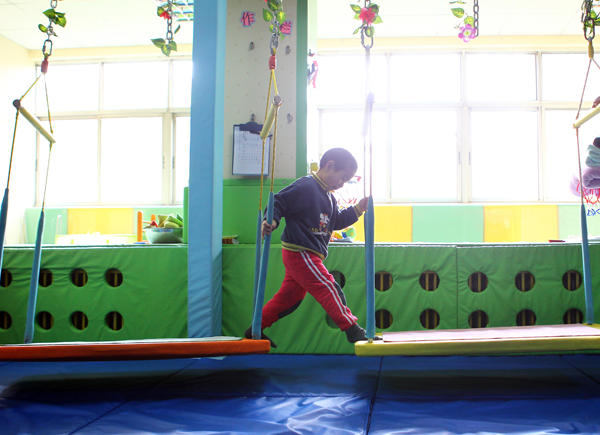Opening up on autism
 |
|
With increasing concern toward the autism community, hundreds of facilities and institutes for autistic children, like the Beijing’s Haidian Modern Kindergarten, have sprung up all over the country. Photos by Zou Hong/China Daily |
World Autism day was on April 2, and to commemorate the occasion, buildings in Shanghai and Beijing lit up for the cause. Liu Zhihua and Nick Compton tell us more about the state of this still mysterious condition in China.
It was an occasion to be blue, as the sixth World Autism Awareness Day fell on April 2.
In China, the autism community has reason to cheer as more and more effort is invested to understand more about the condition.
One 32-million-yuan($5.15 billion) project was launched in November last year, by the Ministry of Health and the Children's Hospital of Fudan University in Shanghai, to estimate the prevalence of autism in China and create universal protocols for screening and treatment.
Since the first reported autism case in the Chinese mainland in 1982 (need to confirm with experts on Monday), society's understanding and acceptance of the disorder has been evolving, making life for families with autistic members easier, but still far from ideal.
 |
| Autism stamps unveiled at UN headquarters |
Zhang Zhengwei, a mother to a 20-year-old autistic son in Beijing, finds life now very different from what she imagined it to be.
The family's first priority is the safety and happiness of their only child, and her sacrifices are too many to list.
Still, Zhang is at peace.
"Things have been much better than in the past," Zhang says. "People know about autism, and, there are a lot of centers offering help."
When her son was little, there was still widespread ignorance about autism, Zhang says, and the family did not get an accurate diagnosis until the child was 5 years old.
Zhang is not alone.
Autism, one of the world's fastest growing developmental disorders, has no cure. The only way to reduce damage is to get children programmatic education and intervention as early as possible, which may help to teach them self-help skills and lessen disruptive behavior.
Related:






















